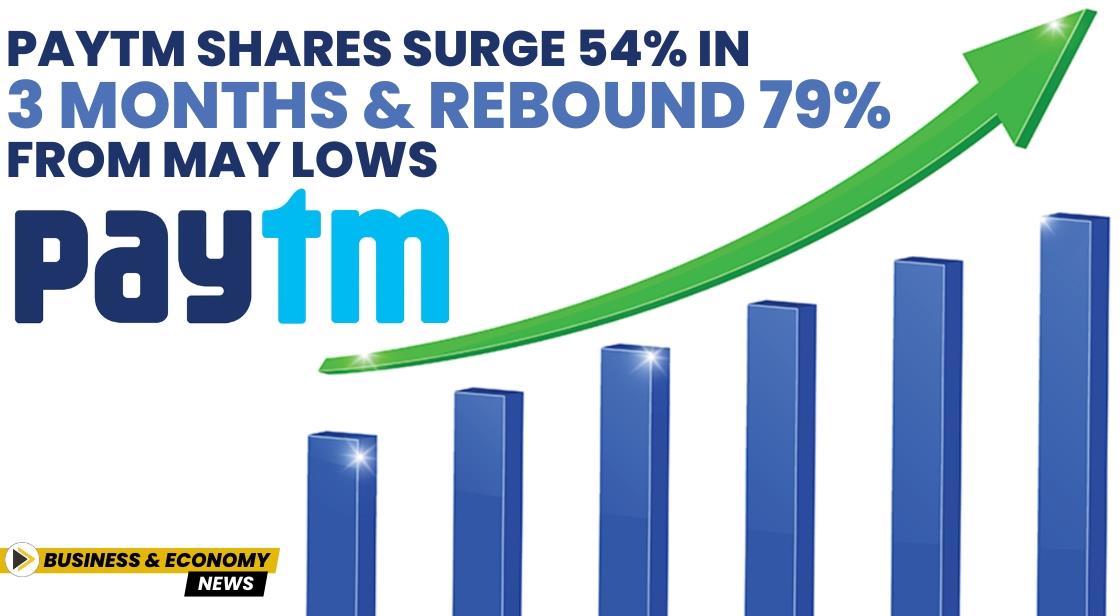Paytm Shares Surge 54% in 3 Months and Rebound 79% from May Lows

News Synopsis
Shares of One 97 Communications, the parent company of Paytm, have demonstrated a remarkable recovery in recent months. The stock has experienced a notable rebound, closing the last three months with a significant gain. This positive movement can be attributed to several favorable developments that have encouraged investors to buy the stock during market dips. As a result, the stock has surged by 54%, reaching ₹554 per share.
Rebound from May Lows
Currently, Paytm's stock is trading 79% above its all-time low of ₹310, which was reached in May 2024. This low point occurred during a prolonged four-month decline following the Reserve Bank of India's (RBI) decision to wind down Paytm Payments Bank due to compliance issues. This regulatory action led to a substantial drop in Paytm's stock value. The recent rebound reflects investor confidence in the company's future prospects despite earlier setbacks.
Recent Strategic Moves
One of the key developments contributing to Paytm’s recent stock performance is the company's agreement to sell its entertainment and ticketing business to food delivery giant Zomato. As part of this agreement, Paytm will continue to offer ticketing and entertainment options on its app for the next 12 months. However, users will be redirected to Zomato’s forthcoming app for the 'going-out' segment. This strategic move aims to refocus Paytm’s resources on its core areas such as payments and financial service distribution.
The deal, which became public in mid-June, is part of Paytm's broader strategy to replace revenue from its entertainment ticketing business and strengthen its core operations.
Financial Performance and Path to Profitability
In the June quarter, Paytm reported a wider loss, largely due to the challenges in its payments business following the RBI’s directive to shut down its banking unit in February. The company’s consolidated net loss expanded to ₹840 crore, compared to ₹358 crore in the same quarter the previous year. Revenue from operations during the April-June period fell by 36% to ₹1,502 crore, aligning with the company’s expectations of ₹1,500 crore to ₹1,600 crore.
Despite these challenges, Paytm is optimistic about its path to profitability. The company anticipates improvements in profitability and revenue starting in the second quarter, driven by better cost management. It expects to see enhancements in operating metrics, such as gross merchandise value and merchant device additions, while employee costs are projected to decrease from July to September.
Cost-Saving Measures
In response to financial pressures, Paytm has proposed capping the salaries of its non-executive independent directors as a cost-saving measure. Effective April, the maximum annual compensation for these directors will be reduced to ₹4.8 million ($57,228), down from the previous cap of ₹20.7 million. This measure is part of Paytm's broader strategy to save between ₹4 billion and ₹5 billion annually in employee costs.
Analysts' Target Prices and Future Outlook
Global brokerage firm Bernstein has reaffirmed its 'buy' rating on Paytm’s stock, setting a target price of ₹600 per share. Bernstein projects that Paytm could achieve profitability by FY 2026–27 and outlines three potential routes to profitability. According to Bernstein, structuring the business within a bank or NBFC with a payments bank license could lead to near-immediate profitability, unlocking significant value. Alternatively, finding a corporate parent could make the business less prone to accidents. If neither of these options is pursued, Bernstein believes profitability might be reached by FY 2027.
Citi Research has raised its target price for Paytm's stock to ₹440 per share, up from the previous target of ₹410 per share. This increase is attributed to the favorable development of Paytm’s sale of its entertainment ticketing business to Zomato. However, the new target price still implies a potential downside of 21.5% from the current stock price.
Emkay Research views the sale of Paytm’s entertainment business as a positive move that could enhance the company’s cash reserves. This additional liquidity might enable Paytm to expand its rewards and cash-back programs, which could help revitalize its struggling payments business. However, Emkay Research also notes that while the one-off gains from the sale may reduce the net loss for FY 25E, they might negatively impact future earnings. The brokerage has maintained its 'reduce' rating on the stock with a target price of ₹375 per share, indicating a more cautious outlook.
Conclusion
The recent surge in Paytm’s stock price and the rebound from its May lows reflect a complex interplay of positive developments and ongoing challenges. The strategic sale of its entertainment and ticketing business, coupled with cost-saving measures, positions Paytm to potentially improve its financial performance. However, analysts have varying opinions on the stock’s future performance, with some projecting continued growth and others maintaining a more cautious stance. As the company navigates these changes, the sustainability of its rally remains a key question for investors.
You May Like









